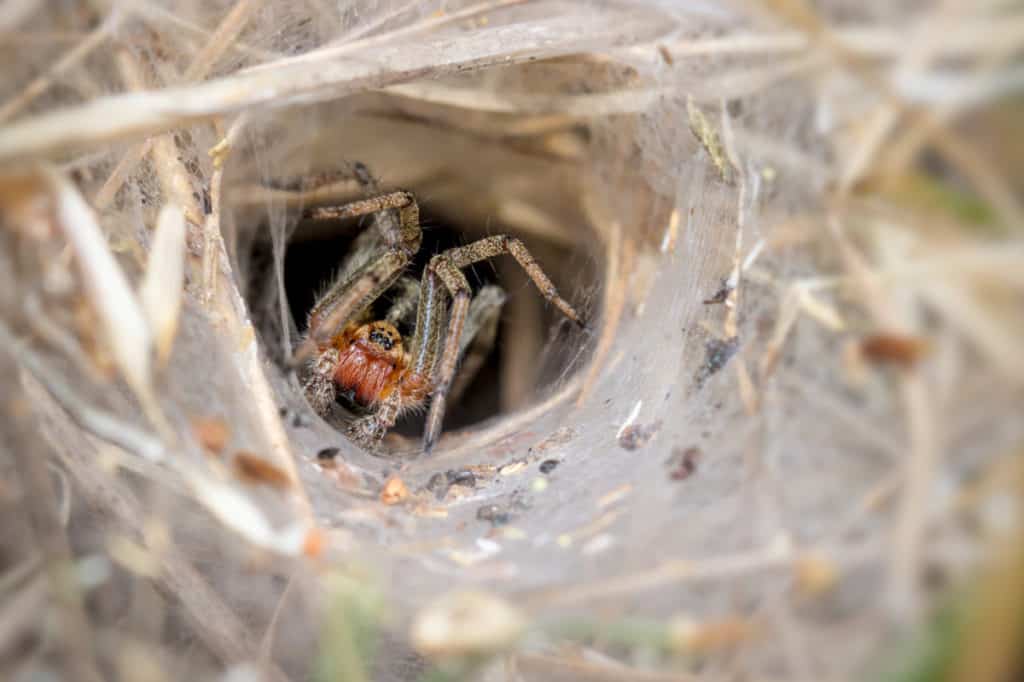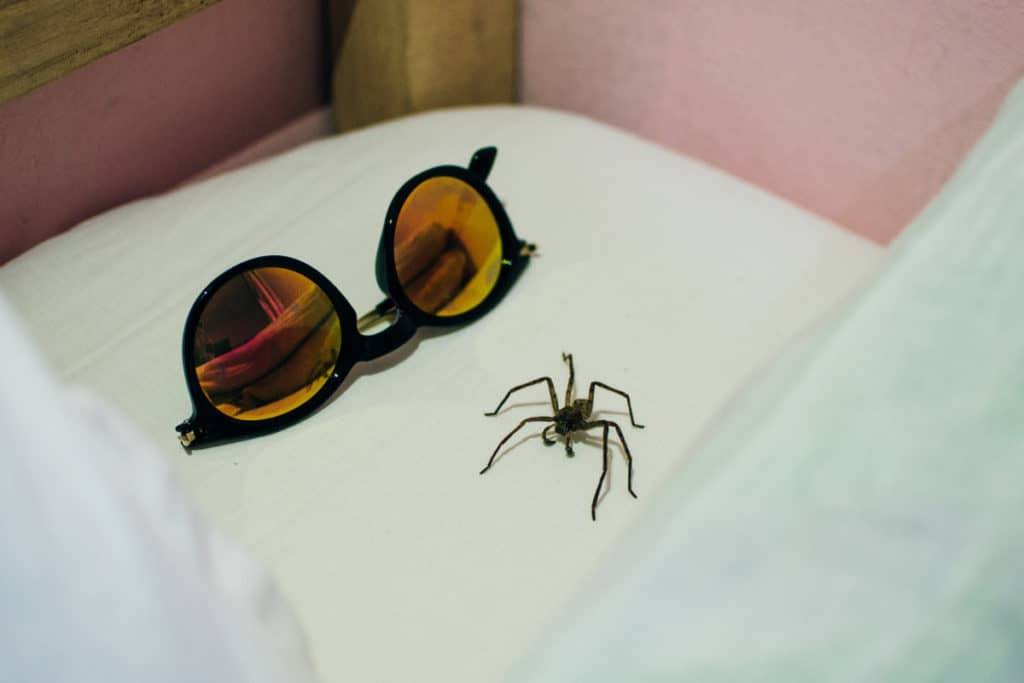If you have noticed spider webs in your home then you surely have wondered where exactly are the “creators behind these webs” and why you cannot see the crawling creatures around?
Well, most likely because you were probably asleep while the hardworking eight-legged critters were working.
So are spiders nocturnal?
Most spiders are nocturnal or active when it’s dark. Spiders have poor eyesight so activity in daylight is risky. Spiders build webs or hunt prey during the night in relative safety. During the day dark hiding places offer protection from predators like birds, reptiles, and wasps who hunt by day.
During the day they tend to hide in crevices or camouflage within their webs or hide under the furniture and other dark spots during the day.
Keep reading to find out what spiders do during the night and whether you are safe from them.
Which Spiders Are Nocturnal?
There are several types of nocturnal spiders including orb-weaver spiders, tangle web spiders, sheet web spiders, funnel-web spider
Orb-weaver spiders are the most common among the nocturnal species. They build spiral wheel-shaped webs and belong to the Araneidae family. These spiders are found both outdoors and indoors.
Tangle or cobweb spiders, sheet web spiders, and funnel-web spiders are also nocturnal. The tangle spiders webs are a mass of tangles that lack structure and tend to collect dirt and debris while the sheet web spiders create flat sheets of silk along with the grass blades and branches.
Funnel spiders make a funnel with their webs and they pull their trapped prey to the center of the funnel where they hide.

But while most spiders are nocturnal, some tend to be diurnal as well. This means they are active at night and for some hours in the morning and then rest for the remainder of the day.
The transition of a nocturnal spider to a diurnal is directly related to sunlight irradiation. Sunlight irradiation strengthens their webs enabling the spinnerets to hang on to pray for longer. With the sunlight come more insects and as a result, the spiders can have more food available so they extend their active hours.
What Do Spiders Do at Night?
Nocturnal spiders come out at night for their midnight snack, by building intricate webs and trapping the prey. The spiders will consume the entire web by dawn and retreat for a well-deserved rest during the day.
Once the sun sets, the crawly munchers get ready for another hard day’s night to construct a new web and trap prey.
It takes the spider an average of one hour to spin a new web. When an insect gets trapped in the web at night, the spider will spend the better part of the night feasting on the prey.
A large insect can take the spider some hours to finish so you may come across the spider still feeding during the day.
Common Myths That Make Spiders Scary at Night
1. Spiders Can See Better In The Dark
False! Spiders are not gifted with good eyesight, to begin with, be it during the day or at night.
When you watch a spider catching its prey that is trapped in the web, it moves quickly and purposefully. However, this is because the spider relies on the vibrations produced by the web as the prey tries to fight the entangling silky spinnerets.
Once the spider senses the vibrations it moves in that direction. So, despite its numerous eyes, a spider can also not see you.
Spiders also have a keen sense of smell. If you are interested we have an article specifically about it called, Do Spiders Have A Nose?
2. Spider Attack People
Spiders are most likely associated with spooking out unsuspecting victims during the night. But that bad rep comes mostly from fictitious accounts. However, you may rest assured that real-life spiders would not attack you while you are asleep.
Spiders are not aggressive by nature so they are not prowling around looking for humans to jump on. Quite the opposite. They hide away from human beings.
Spiders, unlike other arthropods like ticks, do not feed on human blood so they do not need to bite you. Because of their size, they tend to be more of the prey rather than the predators.
What about tarantulas? These are perhaps the most misunderstood spiders in the world thanks to erroneous motion picture storylines. When confronted by human presence, a tarantula which is also nocturnal will hide and stay out of sight.
The myth about tarantulas has given them such a frightful, larger-than-life reputation that is peppered with unfounded stories and even a frenzied dance known as Tarantella.
While there are larger species of the tarantula spider like the Goliath bird eater native to South America, most of them are small spiders with around 2cm leg span.
3. Spiders Have Life-Threatening Venom
Spiders can bite when you accidentally squash them. But the bite is usually a defense mechanism and not necessarily to inject venom. They leave that for their prey. Most spiders have venom in their fangs but it is geared towards subduing their prey not causing harm to human beings.
Very few species have venom that has debilitating effects on human beings, including the black widow and brown recluse spiders. These spiders can cause a wide range of manageable symptoms ranging from headaches, nausea, and dizziness to severe ones like shortness of breath, heart palpitations, and even seizures.
The venom in species like black widows, especially the females, is known as alpha-latrotoxin, which is more potent compared to the latrotoxin in common house spiders. The alpha-latrotoxin quickly targets the human nervous system.
Being bitten by a common house spider does not result in an adverse reaction. A typical bite from a spider may only cause a localized reaction including redness, itching, and mild swelling.
Here is an interesting fact: Did you know that spiders are being farmed for their venom? Their venom is used for its medicinal properties to human life and as an insecticide for plants. It’s being studied for use in treating erectile dysfunction and even muscular dystrophy.
There are one species of spider that is not venomous. These spiders don’t even have venom glands, they belong to the Uloboridae family. The Uloboridae family of spiders includes the cribellate orb weavers or hackled orb weavers.
Because they lack venom they wrap their prey tightly in silk dripping in digestive juices. The enzymes in the juices liquefy the prey and the spiders can then consume it.
These types of spiders may bite but they cannot harm you.
4. Spider Fangs Are Lethal
Spider fangs are not like those you see on a scorpion. They are smaller and they point downwards. Now, what does that mean for you? It essentially means they are not weapons. Because of their size and position, most spider fangs are unable to penetrate the thickness of human skin. So even when they bite they do not leave puncture wounds.
Some of the larger species may leave noticeable bites but their fangs are also not able to sink deep into the human epidermis.
If you are interested in knowing more about the mouth anatomy of spiders check out this article we have written, Do Spiders Have Tongues?
5. Spiders Crawl On People At Night

Spiders can sense your body heat and will intentionally avoid you. So this makes it highly unlikely that they will crawl on you during the night. To support this myth, there is the common belief that spiders like to end up in your mouth or lay eggs on your cheeks. None of this is proven to be true.
Remember, as mentioned before, spiders use their webs to catch food. It is very doubtful that a spider will use your mouth as the site to build its web seeing as you close your mouth and breathe through it if it is open. The combination of your body heat and breathing deters the spider from approaching you even at night.
If you want to really know what spiders eat check out this article we have written, What Do Spiders Eat?
Are Spiders Attracted To Light?
Spiders themselves do not find light attractive. But light attracts the insects that spiders feed, leading the eight-legged arthropods to follow their prey into your home. This may be the reason why spiders enter your house when the light is on.
So avoid keeping the light on outside your house. But in the house, keep the light on in places where the spiders love to weave their web to scare them away.
Also, you can keep spiders out at night by sealing up your house. Spiders can fit into the tiniest crevices, gaps, and cracks in the foundation, under doors and window frames. Clutter in the house creates a conducive environment for spiders to breed and hide.
The clutter also applies to the exterior of the house where you could pile up wood or junk from the house. Such areas accumulate dust which hides the spider eggs until they hatch.
Before retiring for the night, consider putting deterrents like cloves of crushed garlic or peppermint essential oil to repel spiders. Apply to the door and window frames. Also, you can spray the mixture of water and vinegar on the porch or patio.
We actually have an entire article dedicated to this topic if you are interested. The article is called, Are Spiders Attracted to Light?
Do Spiders Sleep?
Seeing as they are nocturnal creatures spiders generally do not sleep at night. But they have hours of inactivity during the day.
Their idea of sleep is to reduce their activity levels completely but they do not close their eyes because they do not have eyelids.
When they reduce their activity their metabolic rate is also lowered giving them energy for the night.
So Why Are We Afraid Of Spiders at Night?
Science says we are naturally born with a fear of spiders and snakes. The fear of spiders is known as Arachnophobia and it is quite common. This is one of the main reasons many people are afraid of spiders at the night.
In a study to determine how human beings respond to spiders and snakes, infants were shown pictures of flowers, fish, spiders, and snakes. The baby’s pupils dilated more when they saw the pictures of spiders and snakes giving the researchers the conclusion that these creatures inherently cause stress to human beings from the earliest stages of life.
You may need to see a professional if your fear of spiders is causing you to lose sleep or become uncomfortable in the dark. A combination of counseling and medication can help you to become desensitized to the presence of spiders in your environment and also to sleep better.
If you are experiencing acute arachnophobia that interferes with your sleep patterns, therapy can help you cope. When you have this phobia you tend to overestimate the likelihood to encounter spiders at night and also their size and aggression. Symptoms of acute arachnophobia include
- Lightheadedness
- Nausea or actual vomiting
- Profuse sweating
- Shakes and chills
- Dry mouth and dilated pupils
- Difficulty breathing
- Stomach upset
The Wrap Up
Spiders prefer to live a solitary life. The night gives them the perfect cover for solitude where they can carry out their nocturnal activities undisturbed. So the next time you encounter a spider at night, there is no need to be afraid. They’re just setting down for a meal and a bit of webbing.
You have also seen that the most common myths about spiders are quite overrated. Hopefully, these facts will bring you much-needed relief to sleep better at night.
Sources
https://www.sciencealert.com/deep-unshakeable-fear-spiders-no-random-quirk-fate-born-arachnophobia
https://www.healthline.com/health/mental-health/fear-of-spiders
https://www.pri.org/stories/2015-11-16/six-things-you-believe-about-spiders-are-totally-false
https://www.livescience.com/23015-erectile-dysfunction-drug-spider-venom.html
https://www.nps.gov/band/learn/nature/upload/tarantula%20fact%20sheet.pdf
http://www.bbc.com/earth/story/20150629-the-truth-about-tarantulas
https://www.eataly.com/us_en/magazine/culture/dancing-the-tarantella/
